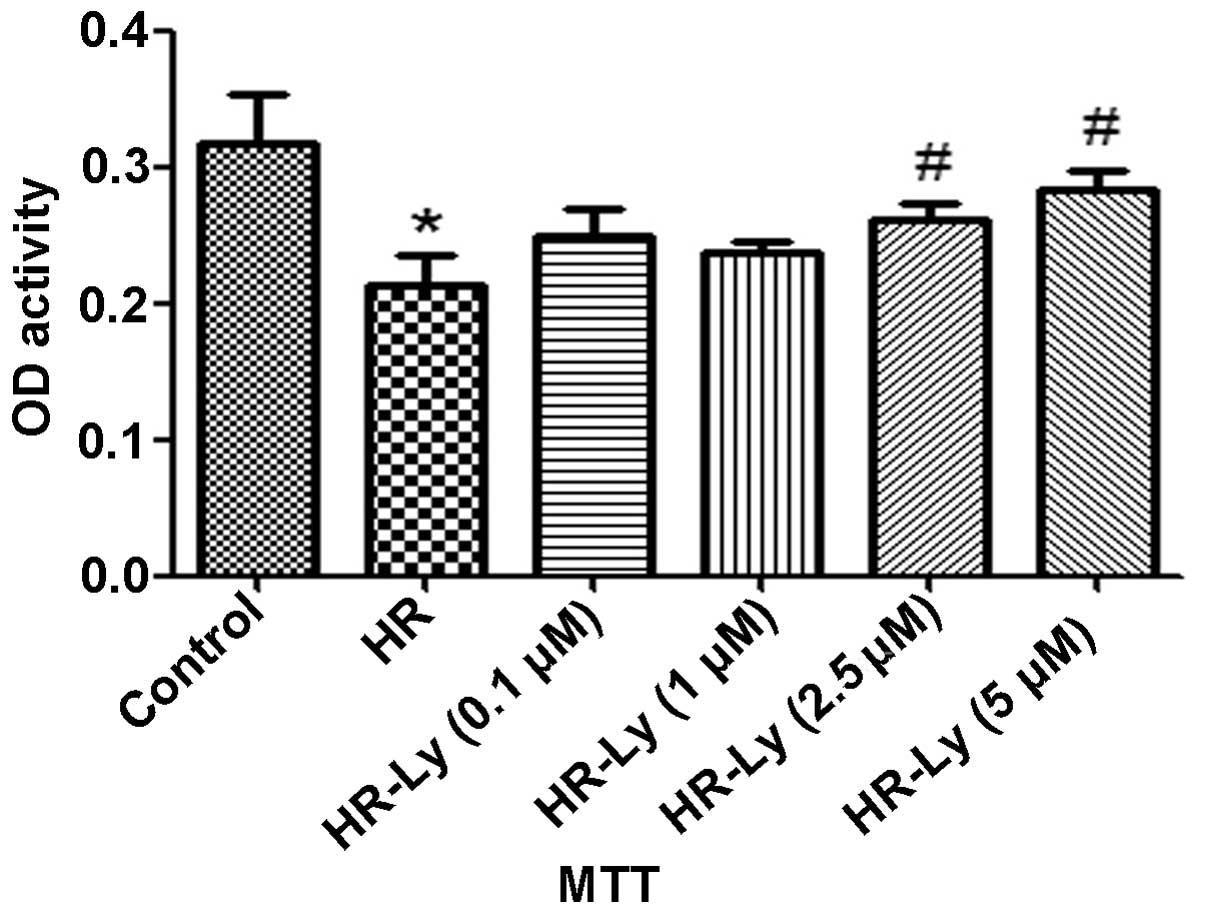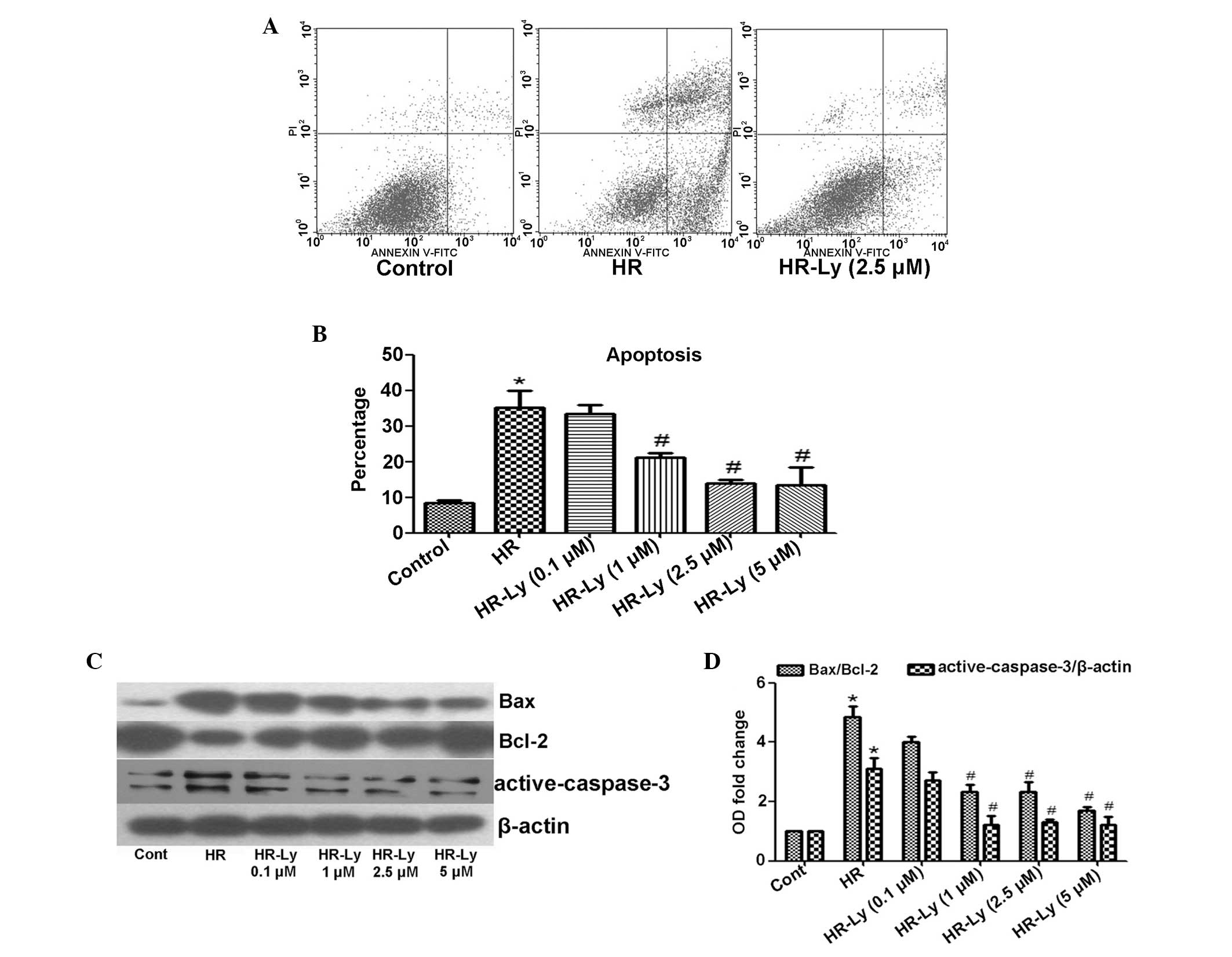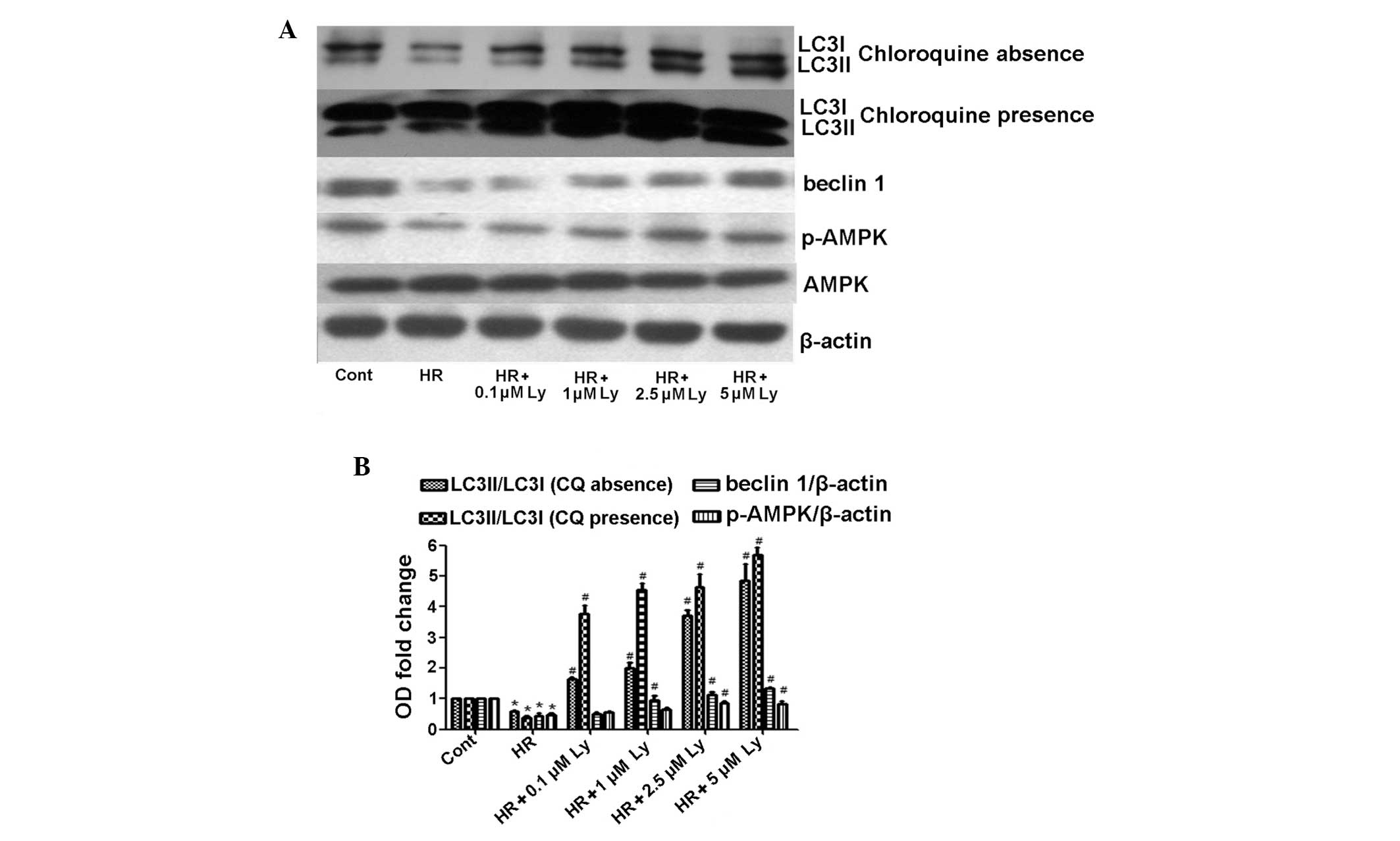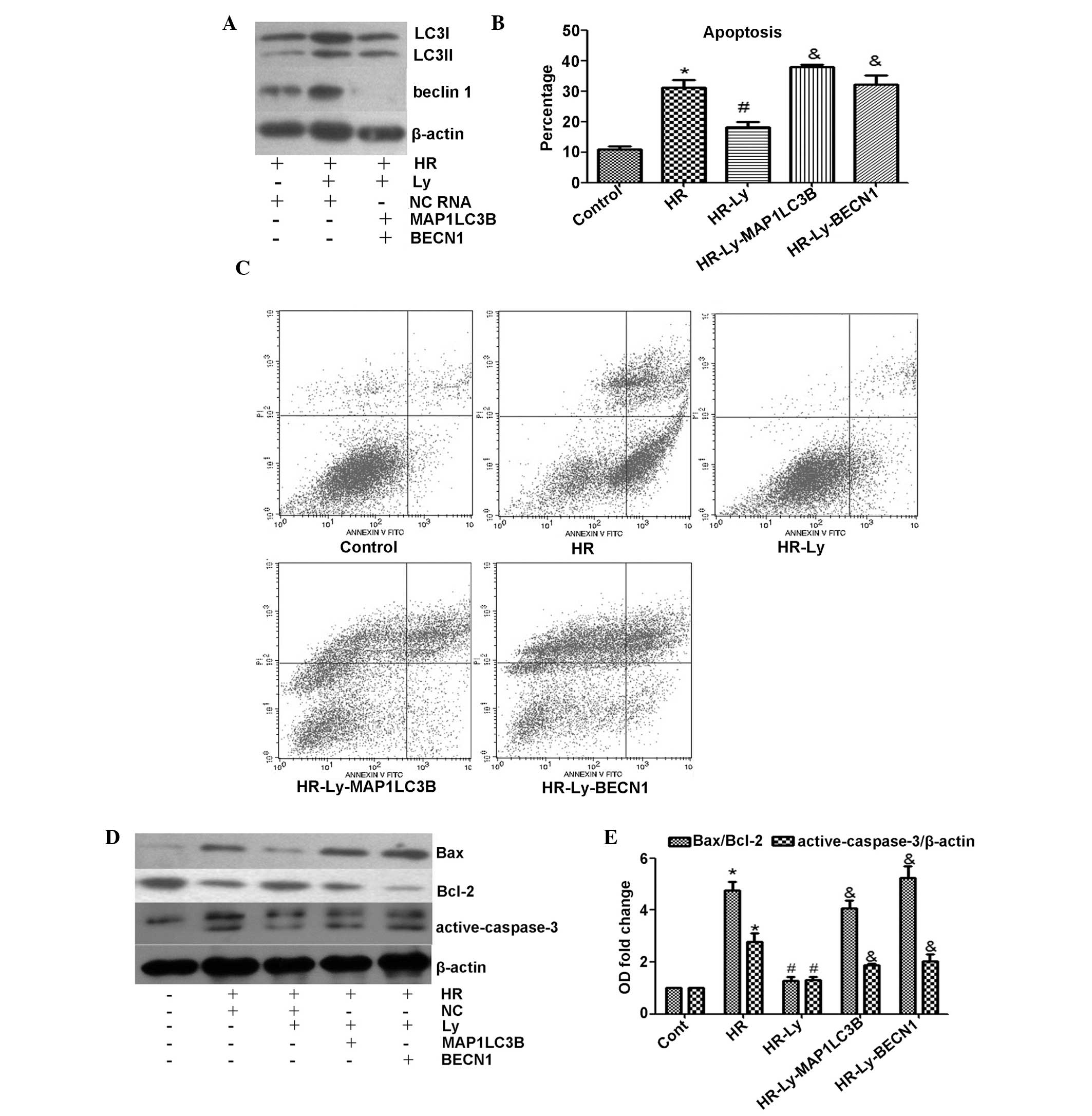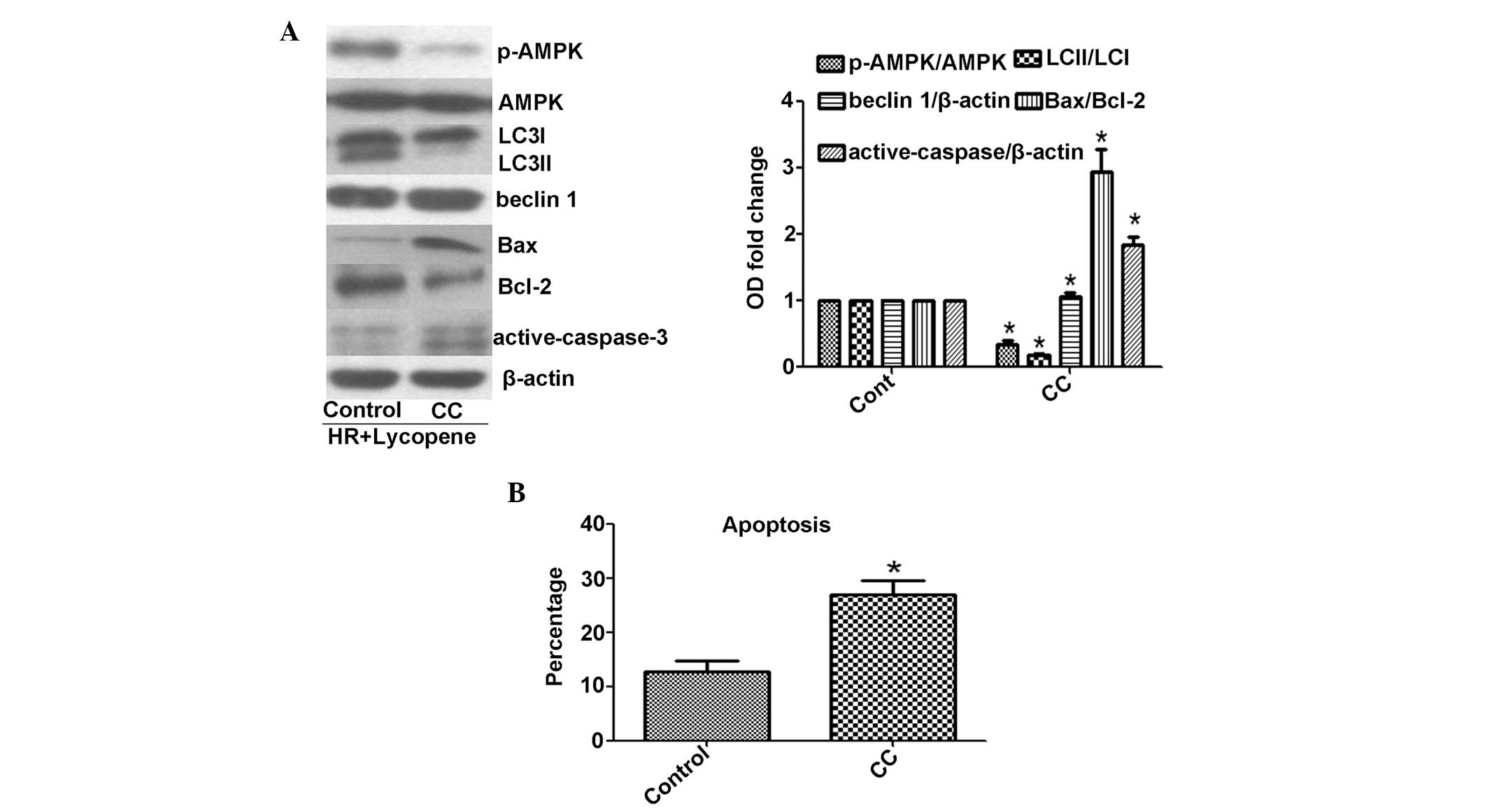|
1
|
Menotti A, Kromhout D, Blackburn H,
Fidanza F, Buzina R and Nissinen A: Food intake patterns and
25-year mortality from coronary heart disease: cross-cultural
correlations in the Seven Countries Study. The Seven Countries
Study Research Group. Eur J Epidemiol. 15:507–515. 1999. View Article : Google Scholar : PubMed/NCBI
|
|
2
|
Yellon DM and Hausenloy DJ: Myocardial
reperfusion injury. N Engl J Med. 357:1121–1135. 2007. View Article : Google Scholar : PubMed/NCBI
|
|
3
|
Givvimani S, Munjal C, Tyagi N, Sen U,
Metreveli N and Tyagi SC: Mitochondrial division/mitophagy
inhibitor (Mdivi) ameliorates pressure overload induced heart
failure. PLoS One. 7:e323882012. View Article : Google Scholar : PubMed/NCBI
|
|
4
|
Levine B and Klionsky DJ: Development by
self-digestion: Molecular mechanisms and biological functions of
autophagy. Dev Cell. 6:463–477. 2004. View Article : Google Scholar : PubMed/NCBI
|
|
5
|
Xu X, Pacheco BD, Leng L, Bucala R and Ren
J: Macrophage migration inhibitory factor plays a permissive role
in the maintenance of cardiac contractile function under starvation
through regulation of autophagy. Cardiovasc Res. 99:412–421. 2013.
View Article : Google Scholar : PubMed/NCBI
|
|
6
|
Pattison JS, Osinska H and Robbins J: Atg7
induces basal autophagy and rescues autophagic deficiency in
CryABR120G cardiomyocytes. Circ Res. 109:151–160. 2011. View Article : Google Scholar : PubMed/NCBI
|
|
7
|
Cao DJ, Wang ZV, Battiprolu PK, Jiang N,
et al: Histone deacetylase (HDAC) inhibitors attenuate cardiac
hypertrophy by suppressing autophagy. Proc Natl Acad Sci USA.
108:4123–4128. 2011. View Article : Google Scholar : PubMed/NCBI
|
|
8
|
Yitzhaki S, Huang C, Liu W, Lee Y,
Gustafsson AB, Mentzer RM Jr and Gottlieb RA: Autophagy is required
for preconditioning by the adenosine A1 receptor-selective agonist
CCPA. Basic Res Cardiol. 104:157–167. 2009. View Article : Google Scholar : PubMed/NCBI
|
|
9
|
Zhao M, Sun L, Yu XJ, et al: Acetylcholine
mediates AMPK-dependent autophagic cytoprotection in H9c2 cells
during hypoxia/reoxygenation injury. Cell Physiol Biochem.
32:601–613. 2013. View Article : Google Scholar : PubMed/NCBI
|
|
10
|
Sharma N and Goswami UC: Functioning of
lycopene in mammalian system: A review. Proc Zool Soc. 64:1–7.
2011. View Article : Google Scholar
|
|
11
|
Voutilainen S, Nurmi T, Mursu J and
Rissanen TH: Carotenoids and cardiovascular health. Am J Clin Nutr.
83:1265–1271. 2006.PubMed/NCBI
|
|
12
|
Kucuk O, Sarkar FH, Djuric Z, et al:
Effects of lycopene supplementation in patients with localized
prostate cancer. Exp Biol Med (Maywood). 227:881–885. 2002.
|
|
13
|
Liu C, Wang R, Zhang B, Hu C and Zhang H:
Protective effects of lycopene on oxidative stress, proliferation
and autophagy in iron supplementation rats. Biol Res. 46:189–200.
2013. View Article : Google Scholar : PubMed/NCBI
|
|
14
|
Li H, Deng Z, Liu R, Loewen S and Tsao R:
Carotenoid compositions of coloured tomato cultivars and
contribution to antioxidant activities and protection against
H2O2-induced cell death in H9c2. Food Chem.
136:878–888. 2013. View Article : Google Scholar
|
|
15
|
Harrison D, Griendling KK, Landmesser U,
Hornig B and Drexler H: Role of oxidative stress in
atherosclerosis. Am J Cardiol. 91:7A–11A. 2003. View Article : Google Scholar : PubMed/NCBI
|
|
16
|
Klionsky DJ, Abdalla FC, Abeliovich H, et
al: Guidelines for the use and interpretation of assays for
monitoring autophagy. Autophagy. 8:445–544. 2012. View Article : Google Scholar : PubMed/NCBI
|
|
17
|
Feng D, Liu L, Zhu Y and Chen Q: Molecular
signaling toward mitophagy and its physiological significance. Exp
Cell Res. 319:1697–1705. 2013. View Article : Google Scholar : PubMed/NCBI
|
|
18
|
Dodson M, Darley-Usmar V and Zhang J:
Cellular metabolic and autophagic pathways: Traffic control by
redox signaling. Free Radic Biol Med. 63:207–221. 2013. View Article : Google Scholar : PubMed/NCBI
|
|
19
|
Takagi H, Matsui Y and Sadoshima J: The
role of autophagy in mediating cell survival and death during
ischemia and reperfusion in the heart. Antioxid Redox Signal.
9:1373–1381. 2007. View Article : Google Scholar : PubMed/NCBI
|
|
20
|
Thomas RL and Gustafsson AB: Mitochondrial
autophagy - an essential quality control mechanism for myocardial
homeostasis. Circ J. 77:2449–2454. 2013. View Article : Google Scholar
|
|
21
|
Kubli DA, Zhang X, Lee Y, et al: Parkin
protein deficiency exacerbates cardiac injury and reduces survival
following myocardial infarction. J Biol Chem. 288:915–926. 2013.
View Article : Google Scholar :
|
|
22
|
Nakai A, Yamaguchi O, Takeda T, et al: The
role of autophagy in cardiomyocytes in the basal state and in
response to hemodynamic stress. Nat Med. 13:619–624. 2007.
View Article : Google Scholar : PubMed/NCBI
|
|
23
|
Thomas RL, Roberts DJ, Kubli DA, et al:
Loss of MCL-1 leads to impaired autophagy and rapid development of
heart failure. Genes Dev. 27:1365–1377. 2013. View Article : Google Scholar : PubMed/NCBI
|
|
24
|
Nishino I, Fu J, Tanji K, et al: Primary
LAMP-2 deficiency causes X-linked vacuolar cardiomyopathy and
myopathy (Danon disease). Nature. 406:906–910. 2000. View Article : Google Scholar : PubMed/NCBI
|
|
25
|
Zhu H, Tannous P, Johnstone JL, et al:
Cardiac autophagy is a maladaptive response to hemodynamic stress.
J Clin Invest. 117:1782–1793. 2007. View
Article : Google Scholar : PubMed/NCBI
|
|
26
|
Takagi H, Matsui Y, Hirotani S, Sakoda H,
Asano T and Sadoshima J: AMPK mediates autophagy during myocardial
ischemia in vivo. Autophagy. 3:405–407. 2007. View Article : Google Scholar : PubMed/NCBI
|
|
27
|
Sciarretta S, Hariharan N, Monden Y,
Zablocki D and Sadoshima J: Is autophagy in response to ischemia
and reperfusion protective or detrimental for the heart? Pediatr
Cardiol. 32:275–281. 2011. View Article : Google Scholar
|
|
28
|
Matsui Y, Takagi H, Qu X, et al: Distinct
roles of autophagy in the heart during ischemia and reperfusion:
roles of AMP-activated protein kinase and Beclin 1 in mediating
autophagy. Circ Res. 100:914–922. 2007. View Article : Google Scholar : PubMed/NCBI
|
|
29
|
Ma X, Liu H, Foyil SR, Godar RJ,
Weinheimer CJ, Hill JA and Diwan A: Impaired autophagosome
clearance contributes to cardiomyocyte death in
ischemia-reperfusion injury. Circulation. 125:3170–3181. 2012.
View Article : Google Scholar : PubMed/NCBI
|
|
30
|
Sala-Mercado JA, Wider J, Undyala VV,
Jahania S, et al: Profound cardioprotection with chloramphenicol
succinate in the swine model of myocardial ischemia-reperfusion
injury. Circulation. 122(Suppl 11): S179–S184. 2010. View Article : Google Scholar : PubMed/NCBI
|
|
31
|
Yan W, Zhang H, Bai X, Lu Y, Dong H and
Xiong L: Autophagy activation is involved in neuroprotection
induced by hyperbaric oxygen preconditioning against focal cerebral
ischemia in rats. Brain Res. 1402:109–121. 2011. View Article : Google Scholar : PubMed/NCBI
|
|
32
|
Liaw NY, Hoe LS, Sheeran FL, Peart JN,
Headrick JP, Cheung MM and Pepe S: Postnatal shifts in ischemic
tolerance and cell survival signaling in murine myocardium. Am J
Physiol Regul Integr Comp Physiol. 305:R1171–R1181. 2013.
View Article : Google Scholar : PubMed/NCBI
|
|
33
|
Valentim L, Laurence KM, Townsend PA, et
al: Urocortin inhibits Beclin1-mediated autophagic cell death in
cardiac myocytes exposed to ischaemia/reperfusion injury. J Mol
Cell Cardiol. 40:846–852. 2006. View Article : Google Scholar : PubMed/NCBI
|
|
34
|
Hamacher-Brady A, Brady NR and Gottlieb
RA: Enhancing macroautophagy protects against ischemia/reperfusion
injury in cardiac myocytes. J Biol Chem. 281:29776–29787. 2006.
View Article : Google Scholar : PubMed/NCBI
|
|
35
|
Hariharan N, Zhai P and Sadoshima J:
Oxidative stress stimulates autophagic flux during
ischemia/reperfusion. Antioxid Redox Signal. 14:2179–2190. 2011.
View Article : Google Scholar :
|
|
36
|
Sesso HD, Buring JE, Norkus EP and Gaziano
JM: Plasma lycopene, other carotenoids, and retinol and the risk of
cardiovascular disease in women. Am J Clin Nutr. 79:47–53.
2004.
|
|
37
|
Rissanen TH, Voutilainen S, Nyyssönen K,
Lakka TA, et al: Low serum lycopene concentration is associated
with an excess incidence of acute coronary events and stroke: the
Kuopio Ischaemic Heart Disease Risk Factor Study. Br J Nutr.
85:749–754. 2001. View Article : Google Scholar : PubMed/NCBI
|
|
38
|
Park S, Kim MY, Lee DH, et al: Methanolic
extract of onion (Allium cepa) attenuates ischemia/hypoxia-induced
apoptosis in cardiomyocytes via antioxidant effect. Eur J Nutr.
48:235–242. 2009. View Article : Google Scholar : PubMed/NCBI
|















